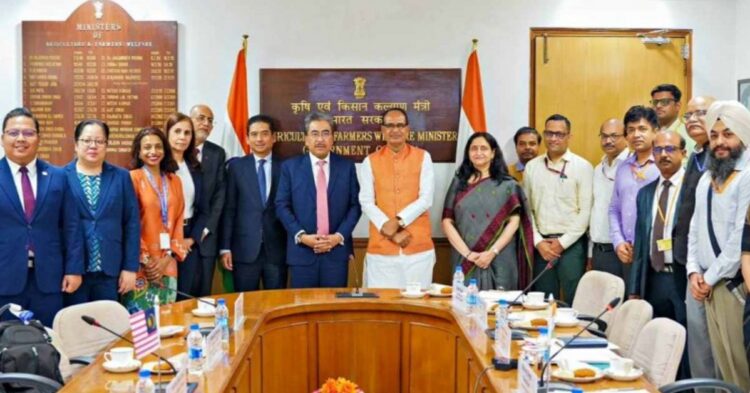India and Malaysia have decided to increase their cooperation in the fields of oil palm and other sectors related to agriculture. This cooperation also includes allied products and the application of digital technology in the plantation sector.
Union Minister for Agriculture and Farmers Welfare and Rural Development, Shivraj Singh Chouhan, and Minister of Plantations and Commodities of Malaysia, Datuk Seri Johari Abdul Ghani, held discussions during the meeting. The Malaysian Minister is on a visit to India from July 16 to 19.
On July 17, he met with Shivraj Singh Chouhan at Krishi Bhawan in New Delhi to explore opportunities to deepen the bilateral agriculture cooperation between India and Malaysia. Both ministers expressed their desire to collaborate on the National Mission on Edible Oil–Oil Palm.
They also discussed market access issues related to agriculture and allied products, the institutionalization of cooperation in agriculture, and the application of digital technology in the plantation sector.
The meeting concluded with the Union Agriculture Minister thanking Minister Johari Abdul Ghani for his fruitful visit to India. He expressed optimism for continued cooperation in agriculture and other areas.
India and Malaysia are witnessing growing engagements in all aspects of their bilateral relationship. This includes political, economic, and trade, defence and security, tourism and education, health, human resources, and public administration.
Over the years, the two countries have signed several Agreements and Memoranda of Understanding in various sectors. India’s major export items to Malaysia include mineral fuels, mineral oils, aluminum and its articles, meat and edible meat offal, iron and steel, copper and its articles, organic chemicals, nuclear reactors, boilers, machinery and mechanical appliances, electrical machinery, and equipment.
This enhanced cooperation in agriculture and digital technology signifies a step forward in strengthening the bilateral ties between India and Malaysia, promising mutual benefits and growth in the sectors involved.

















Comments